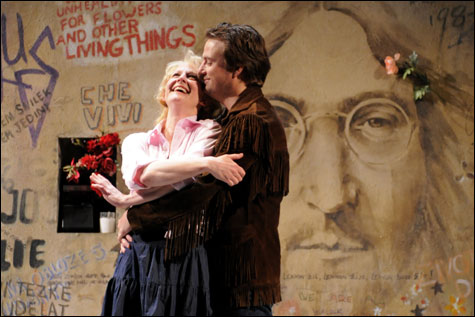
ROCK ’N’ ROLL: So much for those who say Tom Stoppard is all head and no heart. |
"It's not just the music, it's the oxygen," sputters Czech rock fanatic Jan, trying to explain what Pink Floyd and the Rolling Stones mean when you're wrapped in a straitjacket of repression and looking toward a revolution that will prove more velvet than violent. That feeling of being hemmed in and gazing through a shaft toward the freedom that's in the music is ingeniously captured in the American Conservatory Theater/Huntington Theatre Company production of Tom Stoppard's Rock 'n' Roll, currently at the Boston University Theatre (through December 7). Inspired by an Eastern Bloc photograph, Douglas W. Schmidt's monumental set is like a drab tenement laid on its side, so that the audience is looking past gray concrete toward a patch of blank white sky. The production, too, makes it through Stoppard's sumptuously limned tunnel of political argument, Sapphic poetry, human passion, Cold War espionage, and 22 years of Czech history filtered through a lens of disappointed English Marxism to achieve the exhilaration encapsulated in the loud electric-guitar licks that introduce the Rolling Stones at Prague's Strahov Stadium in 1990. But there are some drab patches, as well as brilliant ones, along the way.
The Tony-nominated Rock 'n' Roll is a heady mix, even for one that's seen the churn of Stoppard's brainy blender. The play, its scenes bridged by era-anchoring bursts of the title commodity, straddles not just two decades but two worlds: the leafy academic cloister of England's Cambridge University, where intellectual systems may butt heads but at least dare speak their names, and Prague, in the years between the Soviet quashing of the 1968 Prague Spring and the Velvet Revolution that followed the fall of the Berlin Wall. It is on one level about the supremacy of words as well as music. But, critics of Stoppard as a playwright who's all cerebrum, take note: it also sets up a debate between head and heart, sophistry and soul, that pure emotion, riding the music, carries in the end. As one character, a Czech expatriate looking back from the cusp of the '90s to the anarchic '60s, remarks, " 'Make love, not war' was more important than 'Workers of the world unite.' "

Don't tell that to Max Morrow, a Cambridge professor of cognition and diehard Communist born the same day as the October Revolution. The play opens on the wisteria-draped terrace of Morrow and his classical-scholar wife, Eleanor, where stoned 16-year-old offspring Esme lounges across a table enraptured by a piping figure on the garden wall who may be the Greek god Pan, or Syd Barrett, or both. She's interrupted by Jan, Max's grad-student protûgû, who has come to bid his mentor farewell before hastening home to occupied Prague to save — depending on who he's talking to — either "socialism with a human face" or rock and roll. Suffice to say there's nothing in his luggage but vinyl — or, to the interrogator handling his re-entry, "socially negative music."
From here the play jumps back and forth, though most of the drearier act one is set in Prague, where the Czech-born playwright's alter ego is only slowly politicized, at first resisting his dissident friends' petitions. What turns Jan into a signer of the human-rights manifesto Charter 77 is the Communist government's persecution of the real-life Czech band Plastic People of the Universe, who took their name from Frank Zappa and their morbid drone from the Velvet Underground. According to Jan, the Plastics are not "heretics" but "pagans," inciting the government by their very indifference. Both they and Jan do jail time while, back in Cambridge, Max's arid ideas of cognition go mano-a-mano with the dying Eleanor's white-knuckled defense of identity as a messy stew of brain, sex, and soul.
Rock 'n' Roll is a dense, emotionally and politically complex play, ingeniously constructed so that, as it progresses, the actress playing Eleanor becomes daughter Esme, an adult flower child adrift, while the actress playing teenage Esme returns as her daughter Alice, a prodigy whose protectorate is the now-reclusive Barrett, "an old baldy on a bike" who was once her tripping mom's "beautiful boy as old as music, half-goat, half-god." In ACT artistic director Carey Perloff's warmhearted if not always bristling production, these two women — chiseled, waifish Renû Augesen and cherubic Summer Serafin — look nothing alike, but, hey, use your imagination.
Augesen's moribund Eleanor is more frail than galvanic, but she conveys the wistful rebel spirit of the adult Esme, who when she gets to grab onto a pummeled Pan she hadn't expected seizes it. And Serafin is a convincing adolescent of both acid and academic stripes. One-time ART mainstay Jack Willis is a welcome returnee as the volatile Max. And as Jan, Tony nominee Manoel Felciano ages convincingly from insular young hedonist — for whom taking a stand is tantamount to "moral exhibitionism" — to ruefully seasoned if still rocking citizen of the world.